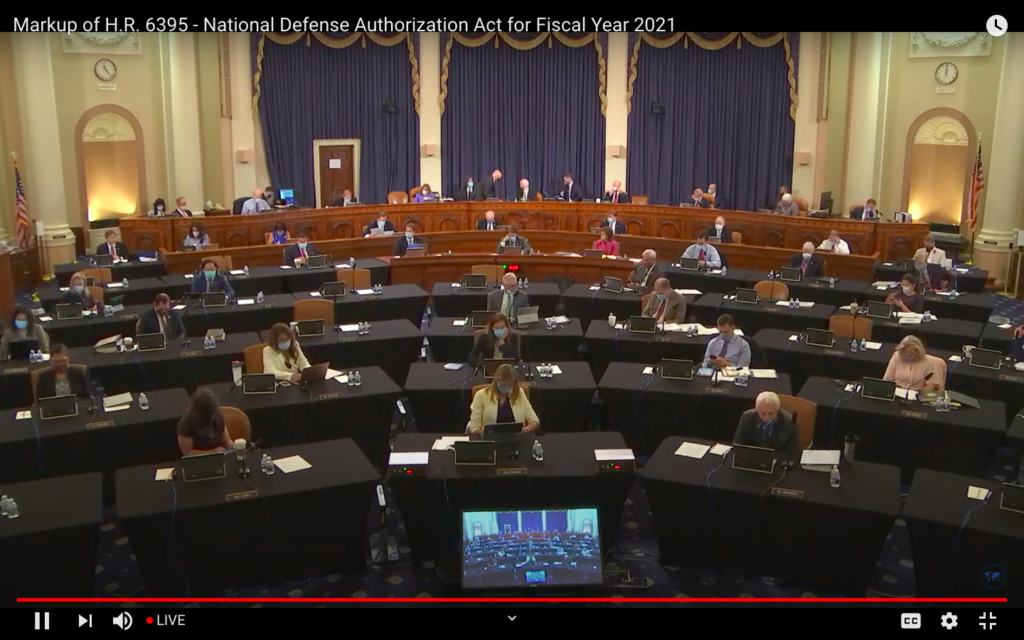
House Armed Services Committee members, masked and socially distant, meet to mark up the annual National Defense Authorization Act on July 1, 2020.
UPDATED with expert analysis WASHINGTON: “I’ll probably burn in hell for doing this repeatedly,” said Rep. Paul Cook, a retired Marine Corps colonel.
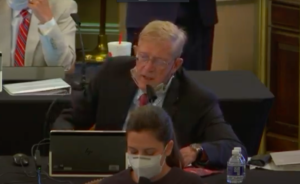
Rep. Paul Cook, mask lowered so he can address the House Armed Services Committee
“This” is the annual rush to use every dollar in your Operations & Maintenance budget before the federal fiscal year ends on Sept. 30. While other “colors of money,” such as procurement, don’t expire as fast – a weapons program can take years to get on contract – O&M is “one-year money.” If you don’t spend it by the end of the fiscal year, you lose it.
True, the use-it-or-lose-it rule is a wonky, low-profile issue, especially in this year’s debate over the annual defense policy bill, which President Trump has threatened to veto if it mandates renaming bases honoring Confederate generals. But because Operations & Maintenance is over 40 percent of the Pentagon budget, the requirement to obligate every penny of it before Oct. 1 distorts decision-making over billions of dollars, year after year, and one of Congress’s most respected defense reformers has decided to take it on as a last hurrah before retiring.

Keeping up the current force — operations, maintenance, pay, & benefits — gets almost twice as much funding as investment in new technologies.
“If you look at the percentage of O&M money that is spent in September, it’s an enormous share,” said Rep. Mac Thornberry, the most senior Republican on the House Armed Services Committee. “We can fuss and complain all we want about DoD not spending money efficiently but here the problem is us — and as a Congress, we can fix it.”
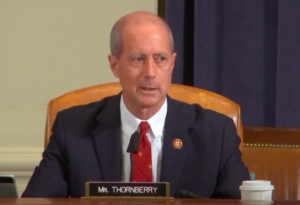
Rep. Mac Thornberry
Other cabinet agencies aren’t as bad as the Defense Department, because they’re allowed to keep 50 percent of unobligated funds into the next fiscal year, Thornberry said: “The Department of Homeland Security, the Department of Treasury, the Department of Transportation, the Department of Housing and Urban Development have that authority.”
Thornberry introduced an amendment this morning to allow DoD to keep 50 percent of unobligated O&M past 1 October – and then immediately withdrew it.
Why? Thornberry isn’t giving up. But today’s venue was the marathon House Armed Services Committee markup of the annual National Defense Authorization Act, and it’s the powerful appropriations committees that have the final say on spending. The House forbids one committee from taking legislative action in another’s jurisdiction without a waiver.
“This amendment has been referred to the appropriations committee, [which] will not waive,” Thornberry said. “So I’m not going to be able to pursue it in the committee. I may well try to pursue it on the floor.”
That’s because the rules on committee jurisdiction no longer hold once a bill goes before the full House of Representatives. On the floor, Thornberry can offer his amendment without appropriators’ approval – which would probably start a fight with key appropriators and others concerned that Congress would give up important oversight authority.
Thornberry has more leeway to tilt at windmills and giants because he’s retiring from Congress at the end of this year. However, the senior Democrat on the committee, HASC chairman Adam Smith, plans to stay around, which means he can’t afford to alienate the appropriators – but he still tentatively supported Thornberry’s proposal for a floor vote.
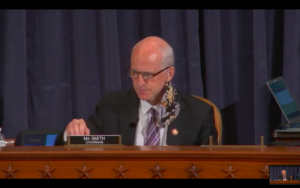
Rep. Adam Smith, mask dangling, chairs the annual markup of the defense policy bill.
“We look forward to working with you, because I do think that’s a significant problem — and it absolutely happens, it’s not just a fairy tale,” said Smith, who’s worked closely with Thornberry for years on bipartisan reforms. “We will try to work on something on the floor and work with the Appropriations Committee on that process.”
Two other members of the House Armed Services rose in support of Thornberry: The most memorable was Rep. Cook, a Republican, but Democrat Rep. Seth Moulton spoke out as well. (Cook and Moulton are both former Marines). Most amendments in today’s high-speed, wide-ranging markup session got far less vocal support.
But it’s Smith’s support that’s crucial and telling. While he’s marvelously snarky, sometimes at fellow legislators’ expense, he’s also a savvy, diplomatic operator who’s willing to spend years laying the groundwork for reform. Even if a floor fight this year turns out to be a losing battle, it could build awareness and support for another try in the future.
Experts Agree
“I wish Mr. Smith and Thornberry good luck,” said Bill Greenwalt, who’s served on both authorizations and appropriations staff. “Why the appropriators are so wedded to creating the incentive for wasteful year end spending by the executive branch in a rush to obligate O&M money and then always leaving money on the table has always baffled me.
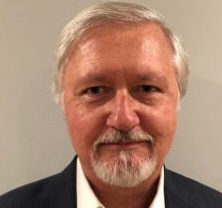
Bill Greenwalt
“Why should perfectly good money, that the members have already used a great deal of political capital to get, be left to expire and be essentially useless?” Greenwalt said. “Over the last two decades, the amount of money the appropriators have let expire and eventually return back to the Treasury could have maintained our technological dominance with China, better supported the health of our troops and their families, or repaired dilapidated facilities on bases. Instead of being creative to try and do these things, the appropriators have worked to protect their jurisdiction and Soviet-style financial practices above anything else.”
UPDATED The Professional Services Council — many of whose members earn their living from Operations & Maintenance contracts — also endorses Thornberry’s idea, albeit in somewhat more diplomatic language than Bill Greenwalt. In fact, PSC hopes the use-it-or-lose-it restriction can be loosened for the current fiscal year, 2020, given the massive disruptions caused by COVID-19.

David Berteau
“Congressman Thornberry is on the right track, but this flexibility is needed even more for FY20 funds which expire in just three months,” said David Berteau, president of PSC and a former Pentagon official himself. “Covid-19 delays have made the annual problem even worse this year, and making funds available past the end of the fiscal year would be one of the wisest actions Congress could take this year.”
“In addition, it should apply government-wide, not just to DoD,” Berteau added. “It requires no new funds, and it would support agency work to counter Covid-19 beyond the expiration of many CARES Act authorities. Finally, it would reduce the uncertainty that all agencies would face in the event FY21 begins under a Continuing Resolution.” (CRs are stopgap spending bills that keep the government running on autopilot at last year’s funding levels when Congress can’t pass regular appropriations before Oct. 1).
Former HASC staffer and Pentagon official Andrew Hunter also sees the logic behind the Thornberry proposal. “There are well documented bad effects from the rush to spend expiring money at the end of the year,” Hunter told me. “Being in a hurry to get money on contract gives leverage to the contractor and also leads to poorly written contracts that hurt both DoD and its contractors.”

Andrew Hunter
“O&M is where this problem is the most acute,” Hunter continued. That includes a great deal of information technology, since rather than buy IT equipment with procurement funds, the government (and businesses) often procure IT as a service, paid for out of the Operations & Maintenance budget. In fact, he warned, “IT services are growing more and more critical to DoD so this issue is becoming increasingly problematic.
“The Section 809 panel referenced this issue in their final report, Volume 3, which may well be what Smith and Thornberry are responding to,” he added. “Smith and Thornberry can likely get what they want into the NDAA, but the appropriators could effectively cancel it by putting countermanding language in their bill. If there were a floor vote on this issue, however, it could give substantial leverage to whichever side won.”
3 – Log 623 Thornberry by BreakingDefense on Scribd
Senate passes $95 billion foreign aid bill, as DoD eyes next Ukraine weapons package
Additional aid for Ukraine could be made available “within days” said Pentagon Press Secretary Maj. Gen. Pat Ryder earlier today.


























